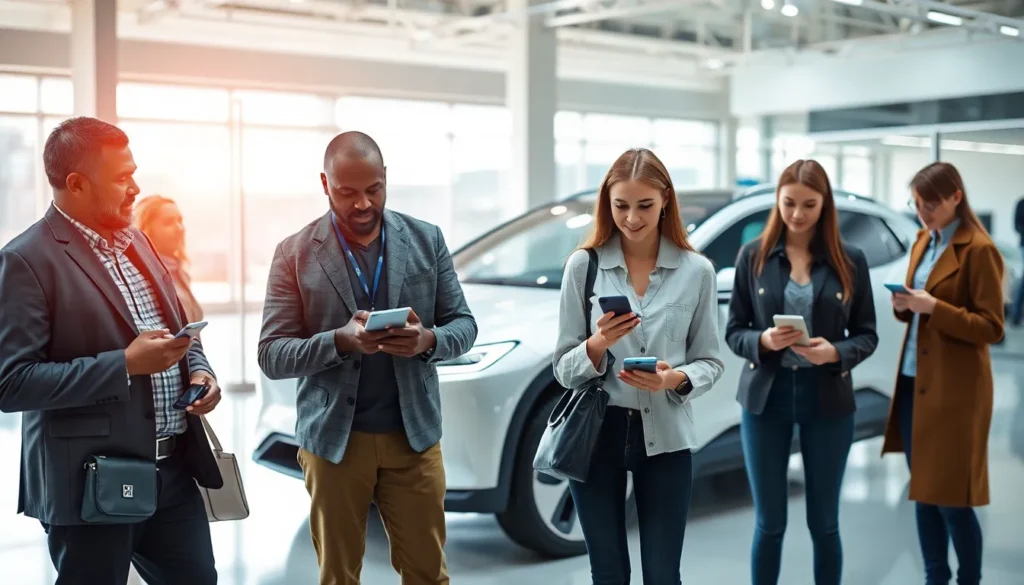Table of Contents
ToggleIn a world where shopping for cars can feel as daunting as navigating a maze blindfolded, automotive digital retailing tools are here to save the day. Imagine trading in the traditional dealership hustle for a smooth online experience that lets buyers browse, compare, and purchase their dream car from the comfort of their couch. These tools are revolutionizing the way people shop for vehicles, making it easier, faster, and dare we say, even fun!
Overview of Automotive Digital Retailing Tools
Automotive digital retailing tools streamline the car buying journey by integrating various functionalities into one platform. These tools empower consumers to explore a wide range of vehicles. Buyers can access detailed specifications, pricing comparisons, and financing options all in one place.
Modern online showrooms allow users to visualize vehicles through 360-degree views and high-quality images. Engaging virtual tours enhance the decision-making process, ensuring that every aspect of a car can be assessed remotely. Users enjoy the flexibility of scheduling test drives or in-person visits at their convenience.
Financial calculators feature prominently in these tools, providing real-time estimates for monthly payments based on specific criteria. Customers can adjust variables such as down payments, loan terms, and interest rates, gaining clarity on budgeting.
Chatbots and AI-driven customer support enhance user experience. These features offer instant responses to inquiries regarding vehicle availability, financing, and dealership services. Human-like interactions make it easier for potential buyers to obtain information without feeling pressured.
Integration with CRM software ensures that dealer teams maintain organized lead management. When customer data is captured efficiently, follow-up becomes streamlined, increasing the likelihood of conversions. Analytics tools offer insights into consumer behavior, enabling dealers to adjust strategies for better engagement.
Mobile accessibility significantly contributes to the appeal of automotive digital retailing tools. Users can browse and interact with digital showrooms from smartphones or tablets, promoting convenience. Overall, these tools create a dynamic environment where consumers can make informed, confident purchasing decisions.
Key Features of Effective Tools

Effective automotive digital retailing tools possess several key features that enhance the car buying experience. Their design focuses on user interaction and efficiency.
User Experience
User experience stands at the forefront of automotive digital retailing tools. A simple, intuitive interface allows users to navigate without confusion. Engaging visuals and high-quality images foster a more immersive exploration of vehicles. Personalized recommendations based on previous browsing behaviors further enhance user satisfaction. Timely access to detailed information empowers buyers, allowing for informed decisions. Integration of chatbots provides real-time assistance, drastically reducing wait times. Responsive designs accommodate all devices, ensuring convenience for on-the-go users. Feedback loops enable continuous improvement, reflecting user insights into tool development.
Integration Capabilities
Integration capabilities represent another essential feature of effective tools. Seamless connections with existing dealership systems create a holistic retailing environment. Proper integration with CRM software allows dealers to manage customer relationships and leads efficiently. Additionally, finance applications synchronize with pricing models for accurate payment estimates. Data analytics tools track consumer behavior across platforms, informing targeted marketing strategies. Compatibility with third-party services increases service options available to buyers, enhancing overall functionality. Customizability enables dealers to tailor features to their specific needs, maximizing opportunities for engagement. Each aspect of integration contributes to a streamlined, effective digital retailing process.
Popular Automotive Digital Retailing Tools
Automotive digital retailing tools revolutionize the car buying journey, providing consumers with accessible and efficient solutions. Here are two popular tools that enhance the online shopping experience.
Tool 1: Description and Benefits
Carvana operates as an online used car retailer that simplifies vehicle purchasing. Customers can browse an extensive inventory, view detailed listings, and complete purchases entirely online. The platform offers features like home delivery and a seven-day return policy, ensuring buyers feel secure in their decisions. Time-saving capabilities appeal to busy consumers, while thorough vehicle inspection reports help build trust in the quality of cars. Financing options presented during the purchase process enhance affordability, making it straightforward for customers to understand their payment responsibilities.
Tool 2: Description and Benefits
Dealer.com provides digital marketing solutions specifically for automotive dealerships. This platform streamlines online inventory management, enabling real-time updates for pricing and availability. Its user-friendly interface allows dealers to design engaging websites that attract customers effectively. Integrations with CRM systems ensure that leads are captured and followed up on promptly. Additionally, analytics features track website performance, assisting dealerships in assessing their marketing strategies. Strengthening online visibility and customer engagement are focal points, maximizing the potential for sales and improving overall dealership performance.
Implementation Strategies for Dealerships
Adopting automotive digital retailing tools requires a strategic approach for dealerships to maximize their potential. First, assessing the specific needs of the dealership sets a solid foundation for implementation. Prioritizing user-friendly platforms ensures both customers and staff can navigate the system efficiently.
Integrating existing dealership systems with new digital tools enhances cohesion in operations. Incorporating customer relationship management (CRM) software is vital for managing leads and tracking interactions effectively. Analytics tools play a crucial role by providing insights into consumer behavior, enabling dealerships to adapt their marketing strategies accordingly.
Training staff on using these new technologies remains essential for success. Engaging employees in hands-on training sessions promotes a better understanding of the tools’ functionalities. Continuous support and resources foster a culture of learning, ensuring the team remains confident and proficient.
Promoting digital tools to customers is an important step. Utilizing social media and email marketing campaigns can inform potential buyers about the advantages of online shopping. Highlighting features like virtual tours and financial calculators can significantly enhance customer interest and engagement.
Monitoring the implementation process allows dealerships to make necessary adjustments. Gathering feedback from both customers and staff leads to continuous improvement in the user experience. Regular audits of tool performance can identify areas for enhancement, ensuring the dealership remains competitive in a rapidly changing market.
Ultimately, a strategic and integrated approach to implementation helps dealerships leverage digital retailing tools effectively, enhancing their overall performance and customer satisfaction.
Future Trends in Automotive Digital Retailing
Emerging technologies are reshaping automotive digital retailing. Artificial intelligence tools enhance customer interactions by personalizing recommendations. Mobile applications simplify the shopping process, enabling customers to browse vehicles on-the-go.
Augmented reality experiences allow buyers to visualize cars in their own environments, improving decision-making. Virtual reality showrooms provide immersive experiences, helping customers feel connected to their potential purchases.
Sustainability initiatives gain traction, with online retailers focusing on eco-friendly practices. Digital platforms will incorporate carbon footprint tracking for vehicle choices, emphasizing environmental impact.
Data analysis continues to evolve, enabling dealers to understand consumer preferences better. Leveraging insights from user behavior will enhance targeted marketing efforts.
Integration of blockchain technology offers increased security and transparency in transactions. Customers benefit from confirmed vehicle history and streamlined financing options through this technology.
Social media platforms become crucial for engaging younger buyers. Online showrooms will likely feature social sharing capabilities, allowing customers to showcase their vehicle choices.
Ultimately, these trends indicate a shift towards more user-centric solutions in automotive digital retailing. Dealerships that adapt to these changes stand to gain competitive advantages in a fast-paced market.
Automotive digital retailing tools are revolutionizing the car buying experience by offering convenience and efficiency. As consumers increasingly prefer online shopping, these tools provide a seamless platform for browsing and purchasing vehicles from home.
With features like virtual tours and instant customer support, buyers can make informed decisions without the pressure of traditional dealerships. The integration of advanced technologies ensures that dealerships can meet evolving consumer expectations while enhancing their overall performance.
By embracing these digital solutions and staying attuned to emerging trends, dealerships can position themselves for success in a competitive market. The future of automotive retailing is here, and those who adapt will thrive.







